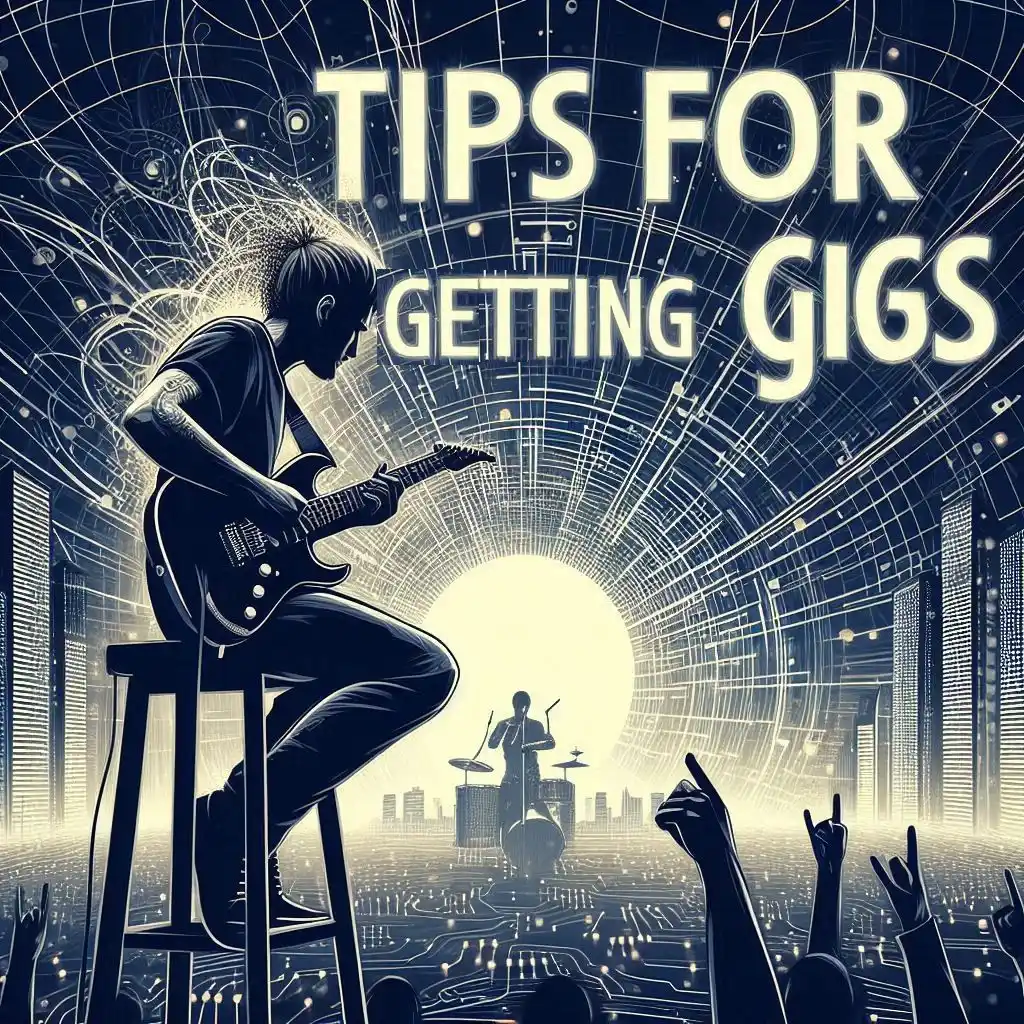
30 Tips For Getting Gigs as a Guitarist
Dreaming of the stage lights, the crowd’s roar, and the thrill of performing live? You’ve come to the right place.
Here are some useful tips for getting gigs as a guitarist:
1. Be Gig-Ready
Before anything, make sure you’re genuinely ready. That doesn’t just mean knowing your songs inside out, but also being confident enough to perform them in front of an audience. You’ll also want to ensure your equipment is in tip-top shape. Nobody wants an amp to blow out mid-solo!
2. Build Your Repertoire
Have a mix of originals (if you have them) and covers. When it comes to covers, make them your own! It’s not just about replicating what’s been done, but putting your unique spin on it. Also, always be ready with more songs than you think you’ll need. An encore request? Be ready for that.
3. Get Your Band Together
If you’re not going solo, you’ll need a reliable and talented group of musicians to back you up. Chemistry is everything. Regular rehearsals will not only sharpen your setlist but will also ensure everyone is in sync come showtime.
4. Start Small
Your first gig doesn’t have to be on the main stage of a massive festival. Start with open mics, small bars, coffee houses, or even parties. These smaller venues give you a taste of live performance without the overwhelming pressure.
5. Network Like a Rockstar
Engage with local musicians, join music groups on social media, and attend local gigs. The more people you meet in the industry, the more opportunities might come your way. Plus, there’s always something to learn from fellow musicians.
6. Record a Demo
You don’t need a high-end studio for this. Even a decent-quality home recording can do the trick. Venues and event organizers will often want to hear from you before booking. Having a demo on hand makes you look professional and prepared.
7. Scout for Opportunities
Keep an eye out for local gig opportunities. Many venues look for live acts, especially on weekends. Drop them your demo, give them a taste of your genre, and who knows? They might just slot you in.
8. Perfect Your Stage Presence
Musical skill is essential, but so is how you present yourself on stage. Engage with the audience, move around, and make your performance memorable. After all, you’re not just playing music; you’re putting on a show.
9. Invest in Good Gear
Good gear doesn’t mean expensive gear. But reliable, good-quality equipment can make a difference in how you sound. Remember, in live gigs, there’s no “take two.” Everything has to be spot on the first time.
10. Learn the Business Side
Gigging isn’t just about the music. Understand contracts, payments, and any other business-related aspects. This ensures you get fair treatment and compensation for your art.
11. Handle Feedback Like a Pro
Not every gig will go perfectly. And that’s okay! Be open to feedback, learn from any mishaps, and always strive to improve.
12. Collaborate
Consider collaborating with fellow musicians. This not only expands your reach but also gives you a fresh perspective on your music.
13. Social Media is Your Friend
Promote your gigs, share snippets of rehearsals, and engage with fans. Your online presence can significantly boost your real-world performance.
15. Stay Committed
The music industry can be challenging. There will be times when gigs don’t go as planned, or there might be a dry spell with no bookings. Stay committed, keep practicing, and always remember why you started.
16. Always Be Professional
Turn up on time. Respect the venue and the staff. Engage with fans after the show. Being professional makes you stand out and can lead to more opportunities down the line.
17. Celebrate Every Gig
Whether it’s a packed venue or just a handful of people at a local bar, every gig is an achievement. Celebrate it, learn from it, and keep pushing forward.
18. Have Backup Equipment
We’ve all heard stories or maybe even experienced the dreaded string snap or a malfunctioning pedal. Always have backup equipment: strings, cables, picks, and even a spare guitar if possible. It may seem excessive, but in the heat of a performance, you’ll be glad you’re prepared.
19. Engage with Other Bands
There’s a good chance you’ll be sharing the stage with other bands, especially at bigger venues or festivals. Make friends, be supportive, and who knows, you might land another gig through a recommendation or even get the chance for collaborative performances.
20. Merchandise! Merchandise! Merchandise!
Got a cool band logo or some quirky designs associated with your music? Turn them into T-shirts, badges, or posters. Selling merchandise at gigs can be a significant revenue booster and also acts as free advertising when fans wear or display them.
21. Understand the Venue’s Acoustics
Every venue is different. Some might have perfect acoustics, while others…not so much. If possible, do a soundcheck before the gig to understand the venue’s sound and adjust your equipment accordingly. It can make a world of difference to your performance.
22. Know Your Rights
There have been instances where musicians weren’t paid or were treated poorly. Understand the legal side of gigging. Know your rights as a performer, and don’t be afraid to stand up for them.
23. Be Adaptable
Sometimes, things won’t go as planned. A band member might fall sick, equipment might fail, or the set might need to be changed last minute. Being adaptable and thinking on your feet can save a gig from turning into a disaster.
24. Get a Manager or Agent (When the Time is Right)
As you play more gigs and gain popularity, managing everything on your own can become overwhelming. Consider hiring a manager or an agent who can take care of bookings, negotiations, and other administrative tasks. They often have connections that can land you even bigger gigs.
25. Collaborate with Local Businesses
Local cafes, breweries, or shops might be looking for live musicians for special events. Collaborating with them can be a win-win. They get live music, and you get a platform and possibly a new set of listeners.
26. Crowd Interaction is Key
Engage with your audience. Dedicate songs, take requests, or even do a short Q&A session during breaks. Making your gigs interactive ensures people remember the experience and are more likely to attend future performances.
27. Safety First
This might sound like a no-brainer, but always ensure your equipment is safely set up. Tripping over wires or having a speaker fall can lead to injuries and ruin the gig.
28. Keep Track of Your Gigs
Maintain a diary or a digital record of all the gigs you’ve played, noting down the venue, the turnout, the setlist, and any feedback. This not only helps in tracking your progress but can also be handy when planning future gigs.
29. Seek Out Festivals and Competitions
Many festivals have slots for emerging artists. Apply for these; they can be an excellent platform to showcase your talent. Similarly, music competitions can provide exposure and even some nifty prizes.
30. Set Realistic Expectations
Every gig won’t be a sold-out show, and that’s perfectly okay. Set realistic expectations, enjoy the experience, and remember, even The Beatles started at small clubs.
Final Thoughts.
Gigging as a guitarist is a journey, filled with highs, lows, melodies, and riffs. Every gig, no matter how big or small, is a stepping stone towards becoming a seasoned performer.
With passion, perseverance, and a sprinkle of rock n’ roll spirit, the stage is yours for the taking.
